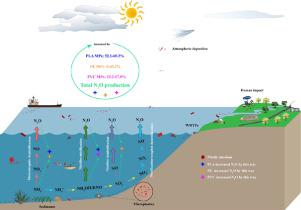Water Research ( IF 11.4 ) Pub Date : 2022-06-10 , DOI: 10.1016/j.watres.2022.118733 Cheng Chen 1 , Jiongyu Pan 1 , Shuxin Xiao 1 , Jiayi Wang 1 , Xiaoluo Gong 1 , Guoyu Yin 1 , Lijun Hou 2 , Min Liu 1 , Yanling Zheng 1

|
Increasing microplastics (MPs) pollution in estuaries profoundly impacts microbial ecosystems and biogeochemical processes. Nitrous oxide (N2O), a powerful greenhouse gas, is an important intermediate product of microbial nitrogen cycling. However, how MPs regulate N2O production and its pathways remain poorly understood. Here, impacts of traditional petroleum-based and emerging biodegradable MPs on microbial N2O production and its pathways were studied through dual-isotope (15N–18O) labeling technique and molecular methods. Results indicated that both traditional petroleum-based and emerging biodegradable MPs promoted sedimentary N2O production, whereas pathways varied. Biodegradable polylactic acid (PLA) MPs displayed greater promotion of N2O production than petroleum-based MPs, polyvinyl chloride (PVC) and polyethylene (PE), of which PLA promoted through nitrifier nitrification (NN) and heterotrophic denitrification (HD), PE through nitrifier denitrification and HD, and PVC through NN. By combining the analysis of N2O production rates with sediment chemical and microbiological properties, we demonstrated that the enrichment of nitrifying and denitrifying bacteria, as well as related functional genes directly and/or indirectly increased N2O production primarily by interacting with carbon and nitrogen substrates. Different response of nitrogen cycling microbes to MPs led to the difference in N2O increase pathways, of which nitrifying bacteria significantly enriched in all MPs treatments due to the niches provided by MPs. However, part of denitrifying bacteria significantly enriched in treatments containing PLA and PE MPs, which may serve as organic carbon substrates. This work highlights that the presence of MPs can promote sedimentary N2O production, and the emerging biodegradable MPs represented by PLA may have a greater potential to enhance estuarine N2O emissions and accelerate global climate change.
中文翻译:

微塑料通过影响河口沉积物中的微生物群改变一氧化二氮的产生和途径
河口日益增加的微塑料 (MPs) 污染对微生物生态系统和生物地球化学过程产生了深远的影响。一氧化二氮(N 2 O)是一种强大的温室气体,是微生物氮循环的重要中间产物。然而,MPs 如何调节 N 2 O 的产生及其途径仍然知之甚少。在这里,通过双同位素 ( 15 N- 18 O) 标记技术和分子方法研究了传统石油基和新兴的可生物降解 MPs 对微生物 N 2 O 产生及其途径的影响。结果表明,传统的石油基 MPs 和新兴的可生物降解 MPs 都促进了沉积 N 2O 生产,而途径各不相同。与石油基 MPs、聚氯乙烯 (PVC) 和聚乙烯 (PE) 相比,可生物降解聚乳酸 (PLA) MPs 对 N 2 O 产生的促进作用更大,其中 PLA 通过硝化器硝化 (NN) 和异养反硝化 (HD)、PE 促进通过硝化器反硝化和HD,PVC通过NN。通过将 N 2 O 产量分析与沉积物化学和微生物特性相结合,我们证明了硝化和反硝化细菌以及相关功能基因的富集直接和/或间接增加了 N 2O 主要通过与碳和氮底物相互作用产生。氮循环微生物对 MPs 的不同反应导致 N 2 O 增加途径的差异,其中由于 MPs 提供的生态位,硝化细菌在所有 MPs 处理中显着富集。然而,部分反硝化细菌在含有 PLA 和 PE MPs 的处理中显着富集,可作为有机碳底物。本工作强调 MPs 的存在可以促进沉积 N 2 O 的产生,而以 PLA 为代表的新兴可生物降解 MPs 可能在增加河口 N 2 O 排放和加速全球气候变化方面具有更大的潜力。











































 京公网安备 11010802027423号
京公网安备 11010802027423号